News and information on the Water and Wastewater industries
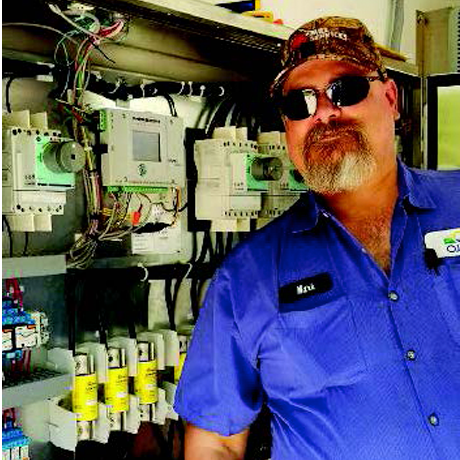 Empowering Smarter Wastewater Management at OJRSA
In the heart of Oconee County, South Carolina, the Oconee Joint Regional Sewer Authority (OJRSA) plays a vital role in transporting and treating wastewater for the cities of Seneca, Westminster, and Wahalla. While each city manages its own collection systems, OJRSA ensures that wastewater flows efficiently from trunk lines to the treatment facility using a combination of pump stations and gravity sewer.
August 19th, 2025
Empowering Smarter Wastewater Management at OJRSA
In the heart of Oconee County, South Carolina, the Oconee Joint Regional Sewer Authority (OJRSA) plays a vital role in transporting and treating wastewater for the cities of Seneca, Westminster, and Wahalla. While each city manages its own collection systems, OJRSA ensures that wastewater flows efficiently from trunk lines to the treatment facility using a combination of pump stations and gravity sewer.
August 19th, 2025
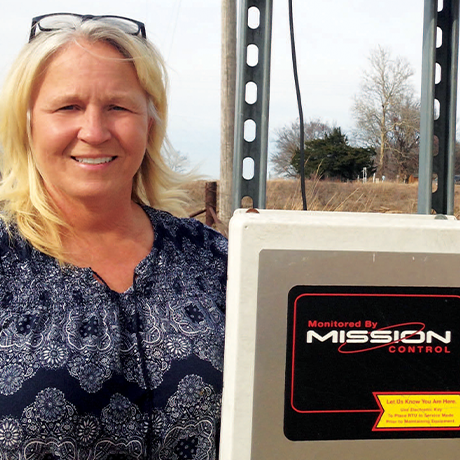 Smart Monitoring Brings Peace of Mind to Rural Water Operations
For nearly a decade, Vivian Shaw has been the backbone of Chautauqua County Rural Water District #4 (RWD4) in Kansas. As the sole operator, Shaw oversees a sprawling utility that delivers potable water across Chautauqua and Montgomery counties and the city of Longton. With approximately 275 miles of pipeline and seasonal water distribution ranging from 50,000 to 80,000 gallons annually, her responsibilities are vast—and until recently, incredibly time-consuming.
August 8th, 2025
Smart Monitoring Brings Peace of Mind to Rural Water Operations
For nearly a decade, Vivian Shaw has been the backbone of Chautauqua County Rural Water District #4 (RWD4) in Kansas. As the sole operator, Shaw oversees a sprawling utility that delivers potable water across Chautauqua and Montgomery counties and the city of Longton. With approximately 275 miles of pipeline and seasonal water distribution ranging from 50,000 to 80,000 gallons annually, her responsibilities are vast—and until recently, incredibly time-consuming.
August 8th, 2025
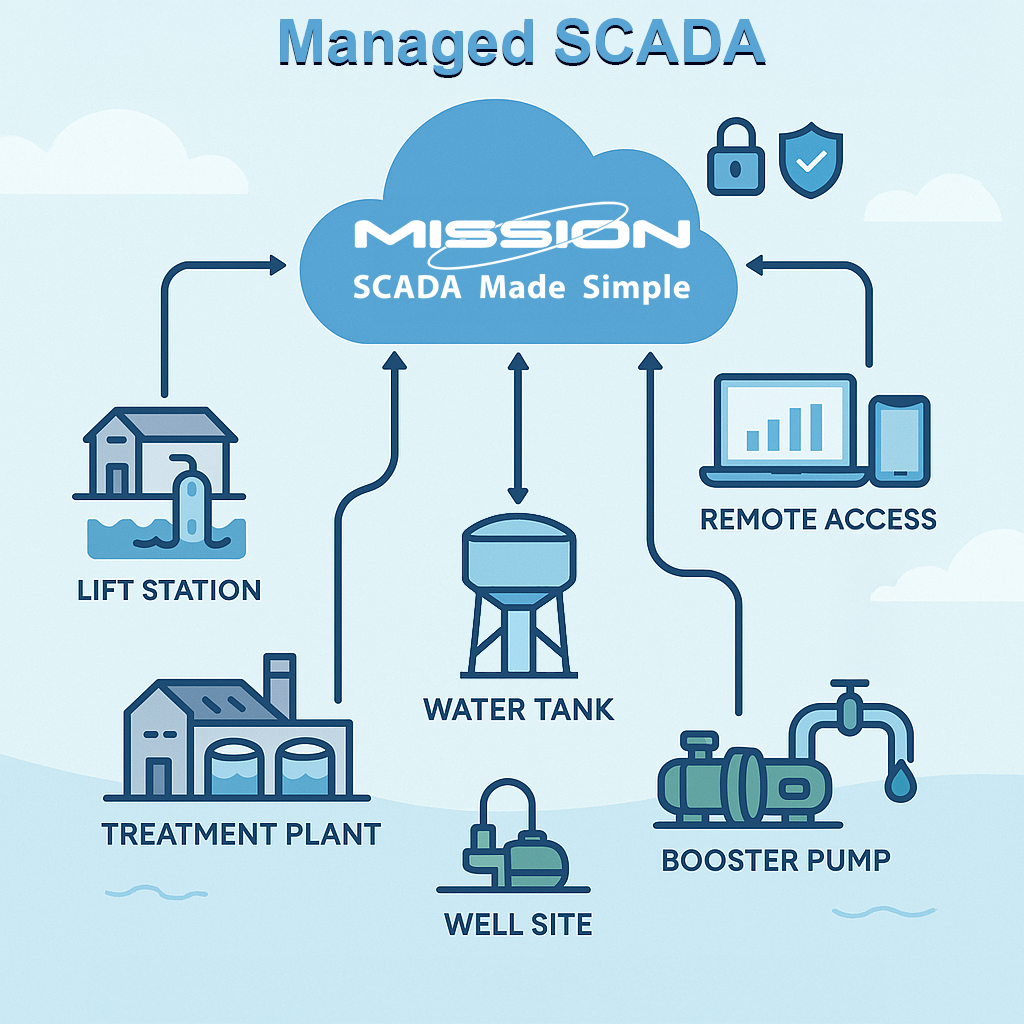 Managed SCADA: A Smarter Approach for Water & Wastewater Utilities
In today’s utility landscape, Supervisory Control and Data Acquisition (SCADA) systems are essential—but traditional models can be costly, complex, and resource-intensive. Managed SCADA offers a modern, cloud-based alternative that’s fully hosted, maintained, and supported by a trusted provider. For small to mid-sized water and wastewater systems, it delivers powerful control and visibility—without the IT burden.
July 2nd, 2025
Managed SCADA: A Smarter Approach for Water & Wastewater Utilities
In today’s utility landscape, Supervisory Control and Data Acquisition (SCADA) systems are essential—but traditional models can be costly, complex, and resource-intensive. Managed SCADA offers a modern, cloud-based alternative that’s fully hosted, maintained, and supported by a trusted provider. For small to mid-sized water and wastewater systems, it delivers powerful control and visibility—without the IT burden.
July 2nd, 2025
 The Importance of Monitoring Water and Wastewater Systems in Growing Rural Municipalities
As municipal decision makers in rural water towns and counties plan for expansion, one critical aspect that must be addressed is the monitoring of water and wastewater systems. Ensuring the efficient and reliable operation of these systems is essential for the health and well-being of the community. One effective solution is the implementation of affordable cloud-based SCADA (Supervisory Control and Data Acquisition) systems, such as those offered by Mission Communications.
June 9th, 2025
The Importance of Monitoring Water and Wastewater Systems in Growing Rural Municipalities
As municipal decision makers in rural water towns and counties plan for expansion, one critical aspect that must be addressed is the monitoring of water and wastewater systems. Ensuring the efficient and reliable operation of these systems is essential for the health and well-being of the community. One effective solution is the implementation of affordable cloud-based SCADA (Supervisory Control and Data Acquisition) systems, such as those offered by Mission Communications.
June 9th, 2025
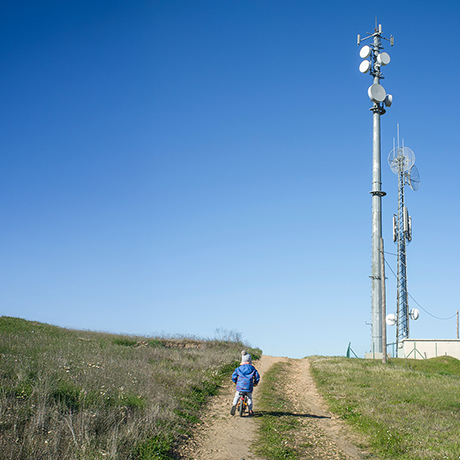 SCADA Systems and Telemetry Monitoring: A Comprehensive Guide
In today’s fast-paced world, efficient monitoring and control of water and wastewater infrastructure are crucial for maintaining smooth operations and reducing costs. SCADA (Supervisory Control and Data Acquisition) systems, combined with telemetry monitoring, offer a powerful blend of hardware and software technologies that improve efficiency, cost, and productivity across various industries.
June 4th, 2025
SCADA Systems and Telemetry Monitoring: A Comprehensive Guide
In today’s fast-paced world, efficient monitoring and control of water and wastewater infrastructure are crucial for maintaining smooth operations and reducing costs. SCADA (Supervisory Control and Data Acquisition) systems, combined with telemetry monitoring, offer a powerful blend of hardware and software technologies that improve efficiency, cost, and productivity across various industries.
June 4th, 2025
 Enhancing Wastewater Treatment Operations with Telemetry-Connected RTUs: Mission Communications as the Gold Standard
Wastewater treatment operations are essential for maintaining public health and environmental safety. However, these operations often face challenges such as equipment malfunctions, inefficient processes, and high operational costs. One innovative solution to these challenges is the use of telemetry-connected Remote Terminal Units (RTUs). Mission Communications, a leader in this field, sets the gold standard for implementing RTUs in wastewater treatment operations.
May 30th, 2025
Enhancing Wastewater Treatment Operations with Telemetry-Connected RTUs: Mission Communications as the Gold Standard
Wastewater treatment operations are essential for maintaining public health and environmental safety. However, these operations often face challenges such as equipment malfunctions, inefficient processes, and high operational costs. One innovative solution to these challenges is the use of telemetry-connected Remote Terminal Units (RTUs). Mission Communications, a leader in this field, sets the gold standard for implementing RTUs in wastewater treatment operations.
May 30th, 2025
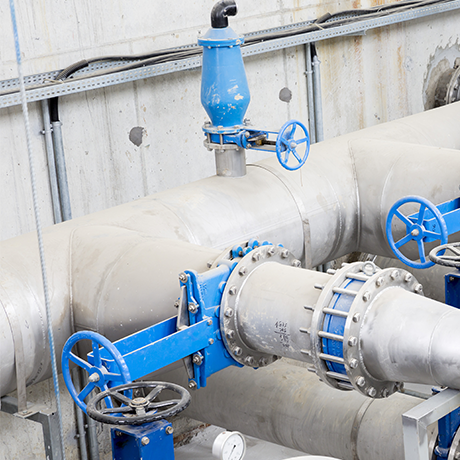 Key Factors for Efficient Lift Station Design: Integrating Mission Communications
In the realm of wastewater management, lift stations play a pivotal role in ensuring the efficient and reliable transportation of sewage from lower to higher elevations. The design of these stations is a critical aspect that directly influences their performance, reliability, and overall effectiveness.
May 26th, 2025
Key Factors for Efficient Lift Station Design: Integrating Mission Communications
In the realm of wastewater management, lift stations play a pivotal role in ensuring the efficient and reliable transportation of sewage from lower to higher elevations. The design of these stations is a critical aspect that directly influences their performance, reliability, and overall effectiveness.
May 26th, 2025
